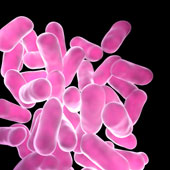Acidophilus - Natural Health Product
Non-traditional solutions to help boost your health and wellness.
Acidophilus
General Information
Acidophilus is a type of bacteria belonging to the Lactobacilli family. Lactobacilli bacteria are found throughout the human body, mainly in the digestive and genitourinary tracts. They can also be found in fermented foods such as yogurt and milk.
Common Name(s)
Scientific Name(s)
Lactobacillus acidophilus

How is this product usually used?
Lactobacillus acidophilus can be taken orally (by mouth) as tablets, capsules, powders, or liquids. It is also available as suppositories. It can also be found in foods such as yogurt that contain this specific type of Lactobacillus.
For oral formulations, a dose of up to 60 billion live lactobacillus acidophilus bacteria taken daily in divided doses is sufficient for most adults. When used vaginally, often doses of 10 million to 2 billion live lactobacillus acidophilus bacteria daily are given.
Your health care provider may have recommended using this product in other ways. Contact a health care provider if you have questions.
What is this product used for?
Acidophilus is considered a probiotic, a word used to describe live bacteria that have health benefits for people who take them in adequate amounts. Probiotics help form part of the healthy, “good” digestive bacteria found naturally in the body. When taken orally, acidophilus may help with digestion and protect against some harmful bacteria that can cause diarrhea.
Acidophilus has been used for a variety of digestive tract problems, including:
- abdominal pain
- constipation
- lactose intolerance
- inflammatory bowel disease (’ulcerative colitis)
- infant colic
- irritable bowel syndrome
- diarrhea prevention and treatment of infectious or antibiotic origin
- diarrhea in children caused by rotavirus
Acidophilus has also been used for bacterial vaginosis and vaginal infections caused by bacteria or yeast.
Other uses include prevention and treatment of common colds and other respiratory infections and childhood eczema.
Your health care provider may have recommended this product for other conditions. Contact a health care provider if you have questions.
What else should I be aware of?
Numerous studies have shown that acidophilus can be effective in the treatment of vaginal infections caused by bacteria, bacterial stomach infections, irritable bowel syndrome, and diarrhea from taking antibiotics. More research is needed to determine its effectiveness for its other uses.
Acidophilus is usually well tolerated in adults and children. The most common side effects of oral supplements are intestinal gas and bloating.
Lactobacilli are bacteria that can cause an infection in people with a weak immune system, such as people with HIV/AIDS or cancer, as well as people who are taking medications that suppress the immune system (for example, those who have had a transplant) or who are receiving chemotherapy. If any of these apply to you, talk to your health care professional first before taking any type of acidophilus supplements.
If symptoms of digestive upset occur, worsen, or persist for more than 5 days, or if you notice blood in your stool, you should discontinue the use of acidophilus and consult a health care practitioner.
Acidophilus should not be taken at the same time as antibiotics–they should be taken at least 2 hours apart.
Before taking any new medications, including natural health products, speak to your physician, pharmacist, or other health care provider. Tell your health care provider about any natural health product you may be taking.
Source(s)
Natural Medicines Comprehensive Database – Lactobacillus acidophilus.
All material copyright MediResource Inc. 1996 – 2020. Terms and conditions of use. The contents herein are for informational purposes only. Always seek the advice of your physician or other qualified health provider with any questions you may have regarding a medical condition.


